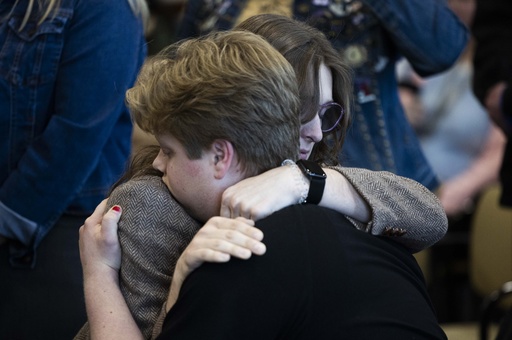Utah Legislation Restricts Transgender Students’ Housing Choices
In Utah, a new bill has been passed that will prevent transgender college students from residing in dormitories that align with their gender identity. The House approved the legislation after minor adjustments, following a contentious debate in the Senate where some remarks were perceived as dismissive towards transgender individuals.
The bill is expected to be signed by Governor Spencer Cox, who has indicated his support for the legislation. The governor’s office has stated that he will thoroughly review the bill before making a final decision, especially since it has garnered sufficient support to override a potential veto in both legislative chambers.
This legislation stipulates that students at public colleges and universities in Utah can only inhabit spaces designated for their sex assigned at birth, including dormitories, bathrooms, and locker rooms. While transgender students will not be allowed to share accommodations aligned with their gender identity, they will have the option of securing individual rooms within coed dormitories.
The new bill extends beyond existing laws in Utah and an additional eleven states, which primarily address access to restrooms for transgender girls and women in public educational institutions and some government buildings. Importantly, this is the first instance of a law specifying restrictions regarding housing for transgender individuals in universities, although some states have broader regulations that might impact dormitory living.
Similar bathroom laws are in place in states such as Alabama, Arkansas, Florida, Iowa, Kansas, Kentucky, North Dakota, Oklahoma, Tennessee, and Utah. Ohio’s related law is set to be enforced on February 25. Meanwhile, in Idaho, the enforcement of these laws has been temporarily halted by a judge.
Utah’s legislative leaders pledged to examine campus housing policies after a viral social media post highlighted a situation involving a transgender student and her roommate. In this instance, Marcie Robertson, a transgender woman and resident assistant for a women’s dorm, was scheduled to share a suite with freshman Avery Saltzman, who later requested a room transfer upon learning of Robertson’s identity, prompting significant online attention.
During a committee meeting, Robertson expressed that the situation has been overwhelmingly stressful, particularly due to the harassment and threats she has faced. She emphasized the painful nature of the legislation explicitly targeting individuals like herself.
Saltzman voiced her discomfort with the current policies that allowed a transgender woman to be assigned to her dorm. She articulated that women often grapple with the dilemma of protecting their own safety or facing social repercussions for resisting living with a transgender individual.
Rep. Stephanie Gricius, the bill’s Republican sponsor, stated that the measure aims to uphold the privacy concerns of female students. Conversely, Rep. Sahara Hayes, the only openly LGBTQ+ lawmaker in Utah, pointed out that Robertson is the individual whose privacy and security have been most compromised in this scenario.
Hayes lamented that this marks the fourth consecutive year that legislation targeting Utah’s small transgender demographic has been proposed by the Republican supermajority. Previous measures included a ban on transgender girls participating in girls’ sports, a restriction on gender-affirming healthcare for youth, and a law prohibiting transgender individuals from using certain restrooms.
Hayes also conveyed the exhaustion and fear experienced by the LGBTQ community as they await further legislative attempts to marginalize them, describing the repetitive nature of such measures as feeling increasingly deterministic.
Within the Senate debate, Senator David Hinkins recounted his personal experience of being removed from Brigham Young University housing for violating its rules, suggesting that individuals who do not conform to social norms should seek alternative arrangements. His comments were seen as directly targeting those affected by the bill.
Senator Daniel Thatcher from West Valley City stood out as the only Republican vote against the bill. He criticized his peers for perpetuating legislation that adversely affects a vulnerable group and suggested that this kind of bill only leads to further legal challenges.



